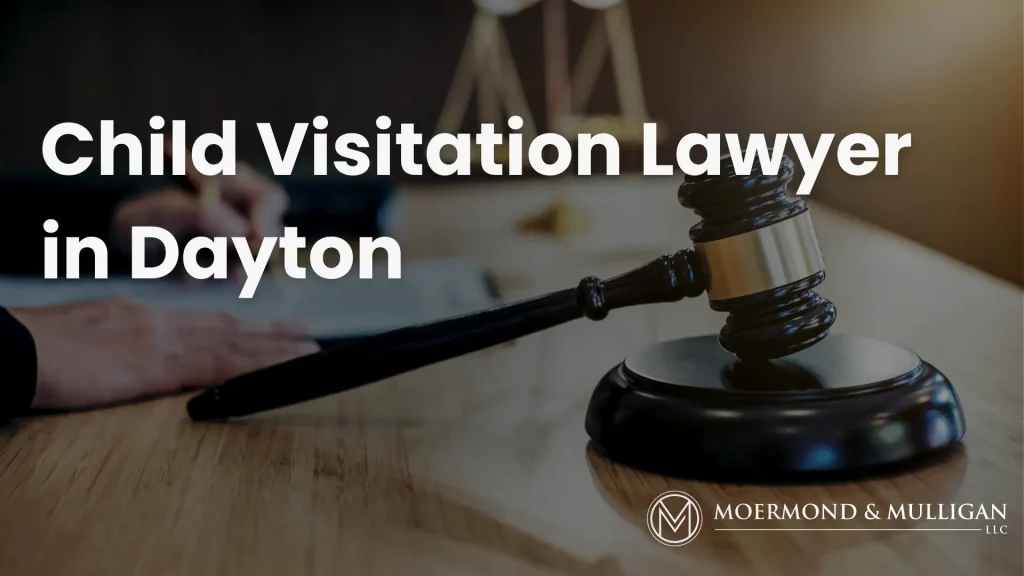
Child visitation is one of the most challenging issues during or after a divorce. Emotions and tensions are high, and the legal process can seem baffling. You may have strong feelings about who should get custody and visitation. How can you protect your child and your own interests to get the best possible outcome??
Ohio visitation law requires parenting time arrangements that support the child’s best interests. That often means creating clear, workable schedules for both parents.
Whether you’re establishing visitation for the first time or facing problems with an existing order, experienced family law advocacy makes a difference. A skilled child visitation lawyer in Dayton can help you understand your rights and pursue time with your child. From navigating early-stage divorce to modifying court orders after big life changes, working with a family law attorney is an efficient, effective way to maintain your parent-child and coparenting relationships.
Moermond & Mulligan, LLC helps parents resolve visitation disputes, modify schedules, and protect their parent-child relationships. Call (937) 228-9790 to learn more about your legal options.
Understanding Ohio Visitation Rights
Understanding Ohio visitation laws is the key to understanding your parental rights and obligations.
Legal Definitions and Parental Roles
Ohio law recognizes two types of parenting roles in custody matters: custodial and non-custodial parents. The custodial parent has the majority of parenting time. They typically provide the child’s primary residence. The non-custodial parent is granted parenting time, which is also referred to as visitation.
Under Ohio visitation laws, courts may use a standard parenting time schedule when parents cannot agree on one. These schedules vary slightly by county and typically include alternating weekends, shared holidays, and extended summer time with the non-custodial parent. Courts may adjust this schedule depending on the child’s needs and the parents’ availability. The law encourages continued contact with both parents whenever it benefits the child. However, specific custody and visitation terms will depend on your unique case and the judge’s discretion.
Joint custody and visitation arrangements are also called shared parenting plans. These plans allow both parents to share legal custody (decision-making authority). These plans work best when both parents are able to communicate effectively and support the child’s routine and well-being.
What Determines Visitation Arrangements?
Visitation schedules in Ohio are guided by one central principle: the best interest of the child. There is a rebuttable presumption that children benefit from time with both parents. This presumption can be rebutted, however, especially if you have evidence of abuse or neglect.
The court will consider several factors when determining a custody and visitation plan. These include:
- Your child’s age and developmental needs
- Your child’s relationship with each parent
- Each parent’s ability to provide a stable home
- Each parent’s ability and willingness to honor the schedule
- All parties’ mental and physical health
- Any history of abuse, neglect, or substance use
In some cases, the court may order supervised visitation. This option protects your child’s safety while preserving parent-child contact. Supervision usually occurs through a neutral third party or a formal program. Ultimately, the court’s goal is to create a visitation plan that supports your child’s emotional and physical well-being.

Establishing and Enforcing Visitation Rights
Parents who were never married or who are not listed on their child’s birth certificate must take extra legal steps. Ohio fathers must establish paternity before seeking any visitation rights. Without this legal recognition, the court cannot grant parenting time.
Once you establish paternity, you may file a petition to request visitation rights. The court will evaluate the case using the “child’s best interest” standard. They may create a new custody and visitation schedule to fit your child’s needs and family circumstances.
If you already have a court-ordered visitation schedule but the other parent is not complying, legal action may be necessary. If your child’s other parent blocks visits without legal cause, they may be found in contempt of court. The court can impose penalties such as makeup parenting time, fines, or, in extreme cases, jail time.
Some child visitation cases require parenting coordination services. A parenting coordinator is a neutral third party who helps resolve disputes about visitation and ensures visitation order compliance without repeated court appearances.
Working with a child visitation rights lawyer can help you navigate this process. An experienced attorney from Moermond & Mulligan, LLC can help you properly file paperwork and advocate for meaningful parenting time. Our firm can also help you respond to opposition from the other parent, build a case for supervised or unrestricted visitation, or seek order enforcement.
Court Order Modification and Disputes About Visitation
Life circumstances change. Work schedules shift, parents move, and children’s needs change as they get older. Ohio courts allow parents to request changes to custody and visitation orders, but only under certain conditions. You must show that the change is in the child’s best interest. You also must show that there has been a substantial change in your circumstances since the original order.
Common reasons to seek modification include:
- One parent’s relocation
- Significant changes in work or school schedules
- The child’s age or developmental needs
- Health issues affecting a parent or child
Unfortunately, some parents cannot agree on what’s in their child’s best interests. There are a few options for visitation dispute resolution before you need to resort to litigation:
- Mediation: A mediator (neutral third party) can help both parents reach an agreement.
- Parenting coordination: A parenting coordinator can be appointed to help enforce or adjust visitation schedules. This is especially common in high-conflict cases.
While it’s always nice when parents can agree on custody and visitation issues, sometimes court intervention is necessary. This often happens when:
- A parent repeatedly violates the order
- One parent refuses communication or negotiation
- There is suspected abuse, neglect, or immediate danger
In urgent cases, parents may seek emergency relief to temporarily change the parenting time order. Moermond & Mulligan, LLC can act quickly to file motions and advocate for protective or restorative measures.
Whether you’re navigating a legal separation and visitation disagreement or need child custody mediation in Dayton, experienced legal support helps you protect your child’s well-being and your parental rights. Moermond & Mulligan, LLC is here to help. We can listen to your concerns and present evidence to support your request. When you work with us, we’ll advocate for fair, workable parenting time adjustments that prioritize your and your child’s best interests.
Visitation Rights for Other Family Members
Family members often ask if they can petition for visitation rights, especially when one or both parents are deceased. First, Ohio grandparents may request visitation in limited circumstances. Courts may allow grandparent visitation rights if it serves the child’s best interest and:
- One or both parents are deceased
- The child’s parents are divorced or legally separated
- The child was born to unmarried parents
Even if you can meet these condition, the court gives will give weight to the custodial parent’s parental rights. Grandparents must show a prior relationship with the child and that ongoing visitation benefits the child’s emotional and developmental needs.
Courts consider:
- The wishes of the child, if old enough
- The child’s health and safety
- The past relationship between grandparent and child
- How visitation will affect family dynamics
In contrast, Ohio typically doesn’t give visitation rights to extended family members like aunts, uncles, or adult siblings. However, courts may consider their petitions in certain circumstances. For example:
- The relative has acted as a caregiver or guardian
- The child has lived with the relative for an extended time
- Denying contact would harm the child emotionally
These cases are unusual and are evaluated carefully. The goal is to preserve the child’s stability and continuity, not disrupt established custodial arrangements.
Why Choose Moermond & Mulligan, LLC for Your Dayton Visitation Case?
Every family is different. Moermond & Mulligan, LLC offers personalized legal strategies tailored to meet each of our client’s unique needs and goals. Whether you’re seeking visitation, enforcing a court order, or facing a dispute, we work to protect your parental rights while minimizing conflict.
With over 50 years of combined experience, our attorneys bring deep knowledge and proven skill in every case. Our firm has handled a range of family law matters in Dayton and throughout Montgomery County with our signature client-first approach. Plus, our familiarity with local courts, judges, and procedures allows us to anticipate challenges and strategically pursue the most favorable outcome possible.
If you need help with a child visitation matter, don’t face the courts on your own. Contact Moermond & Mulligan, LLC to learn how we can help.
FAQs About Child Visitation in Dayton
Our attorneys are happy to answer all your questions, from initial consultation to case resolution. Some of our most common questions include:
Can a parent be denied visitation rights in Ohio?
Yes. Courts can deny visitation if they believe it endangers your child’s physical or emotional well-being. This includes cases involving abuse, neglect, or addiction. In some cases, they may order supervised visitation instead of a full denial.
How can I modify an existing visitation order in Dayton, Ohio?
You and your attorney can request modifications by filing a motion with the court. You’ll need to show a substantial change in circumstances that affects the child’s well-being. Common reasons include changes in work schedules, relocation, or safety concerns.
What happens if the other parent refuses to follow the visitation schedule?
Our firm can help you file a motion to enforce the court order. The court may hold the parent in contempt, order makeup visitation time, or impose penalties. Consistently denied visits may also support requests to change or establish custody.
Talk to a Dayton Child Visitation Lawyer Today
If you’re facing a visitation issue in Dayton, Moermond & Mulligan, LLC is here to help. Our attorneys understand the emotional and legal challenges involved—and we’re ready to advocate for your rights. If you are also facing criminal charges in connection with your family matters, we can connect you with our Dayton criminal defense lawyers for the help you need. Contact us to get started and learn more about our family law services.
Last Updated: 09-16-2025